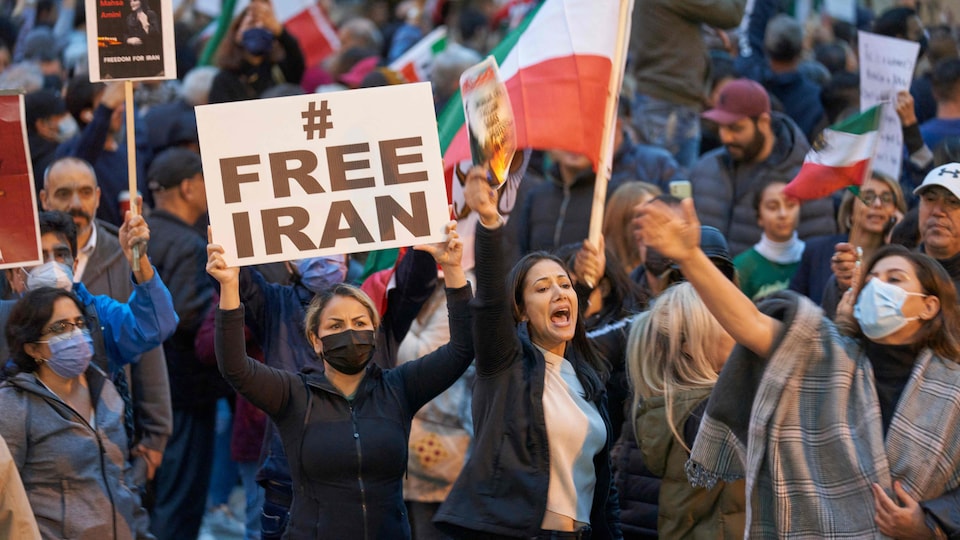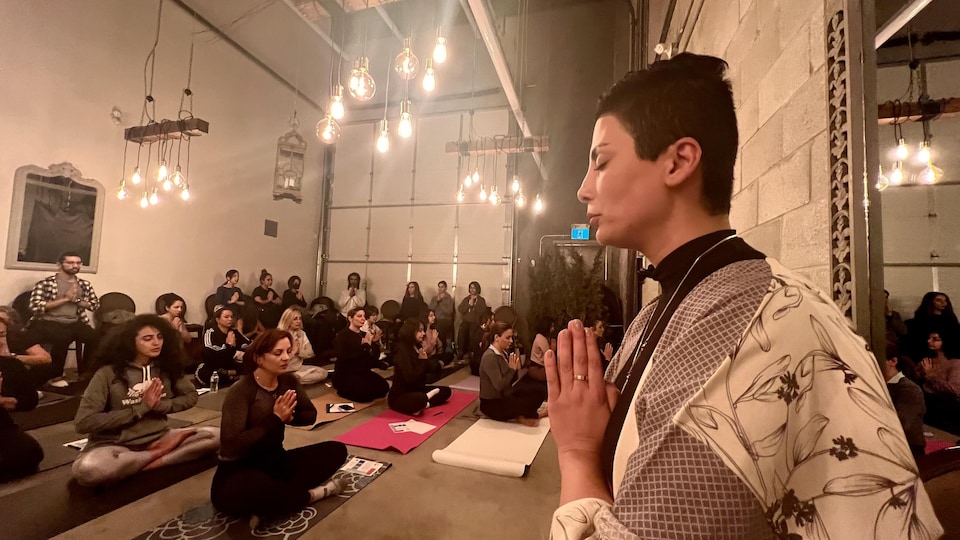In the large room adjacent to the Iranian pastry kitchen Miraas Cafe & Pastry, located in Vaughan, north of Toronto, about 60 women are sitting on their yoga mats. The room is so full that many have to sit on chairs leaning against the walls.
A few sobs pierce the silence. A woman tilts her head forward and wipes away her tears with a handkerchief.
We have been through a revolution, a war, suffering, the immigration process and now that we are witnessing what is happening [en Iran]we have to practice self-love, take care of ourselves, because no one else will do it for us
says Bibi Rosa, who guides the mindfulness session in a soft voice, to her students.
The death of Mahsa Amini last month and the wave of protests that followed have awakened deep trauma among Iranians in the diaspora. The need to come together is more important than ever for the community, explains Bibi Rosa.
” People can then realize that they feel the same anger, the same shame for not being there, the same unhappiness, that everyone is having trouble sleeping »
The Middle East specialist at the Center for International Studies and Research at the University of Montreal, Vahid Yücesoy, himself of Iranian origin, agrees.
The Iranians have tried to change their fate on several occasions only to unfortunately come up against several pitfalls. […] Every time there are failures, it creates trauma, it creates disappointment, it creates unbearable situations
he said.
” It is a diet that penetrates all spheres of life. […] It created a kind of depression, a trauma that affects Iranians a lot, even in exile. »
Mindfulness as an outlet
Born in Iran just a few years after the 1979 Islamic Revolution, Bibi Rosa grew up under the bombs of the Iran-Iraq War, the dictates of her family and those of the morality police. She says she was beaten in the middle of the street while she was walking with her fiancé and threatened with death several times by her father.
I was going to college, but I couldn’t concentrate. My traumas began to manifest through different physical and mental health issues
says Bibi Rosa, who suffers among other things from fibromyalgia, a chronic disease consisting of general pain which, according to her, is directly linked to her traumas.
It was his Canadian therapist who introduced him to mindfulness, a form of meditation that involves living in the present moment.
Now 41, she teaches this technique in Persian on the Internet and social networks. Its courses are attended by tens of thousands of people, the majority of whom live in Iran.
The proof according to her that this practice offers an essential outlet in an increasingly oppressive theocracy.
Many students take part in our meditation sessions and feel they have a platform, a safe space to talk. It brings up a lot of trauma and we help them find out how it affects them.
explains Bibi Rosa.
A risky practice in Iran
Iranians’ growing interest in practices like meditation, yoga and mindfulness comes as no surprise to Vahid Yücesoy.
Religion over the past four decades has created enormous disappointment among the people. This alienated Iranians from religion and Islam and created a spiritual void. […] So this kind of spiritualism is more and more common and widespread in the country
he argues.
People are looking for other ways to soothe themselves
also believes Azadeh Satloo, who came to participate in Bibi Rosa’s workshop.
In Iran, those who dare to deviate from the official doctrine, however, attract the wrath of the regime. Mindfulness practitioners are no exception.
Bibi Rosa claims that several members of her community have received threats from the regime.
One of his mentors, the Iranian Zen Buddhist monk Dotetsu Zenji, now living in London, even says he was arrested and tortured. The regime also prevented him from teaching meditation.
They fear that young people will be attracted to something new
he said.
More than a spiritual practice, Bibi Rosa sees her teachings as an act of resistance against the regime.
Understand that good and bad all happen in life. Questioning the existence of hell and paradise, talking about it can send you to prison and sign your death warrant
she says.
We would love to say thanks to the writer of this article for this remarkable content
Mindfulness, a weapon against trauma and the Iranian regime
Check out our social media profiles as well as other pages related to themhttps://nimblespirit.com/related-pages/


